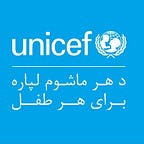Washing away a village’s hardships
Clean water provides a fresh start in Gardez
© UNICEF Afghanistan/2017/Sahraa Karimi
GARDEZ, Afghanistan, 23 August 2017 — It’s a gloomy summer day in Sarsang village, a community of 500 families near the border with Pakistan, but the sound of laughter and joyful banter fills the air as children kick a football around the muddy streets.
They have good reason to celebrate: a reservoir was recently constructed in Sarsang village, providing clean water to the village for the first time.
Bi Bi Hajera, 60, a grandmother of eight, has spent her whole life in Sarsang. Her eyesight is poor and her body shows the wear and tear of the challenges of rural life. “When I was a girl, I had to go long distances for clean water for us and the livestock,” she recalls. “I don’t remember a single day that I did not have to do that. The barrels were so heavy.”
“Now that we have access to clean water, I see my grandchildren play and how much happier they are. They enjoy their childhood, not being sent far away to do such hard work,” she says.
Over 7.5 million children in Afghanistan don’t have access to safe clean water, subjecting them to unnecessary dangers to their health, safety and development. Children are particularly at risk from water-related diseases; access to clean water can improve their health and therefore school attendance, which has lifelong positive consequences.
Improved water supply and sanitation and better management of water resources can also boost economic growth and contribute greatly to poverty reduction.
Mohammad, 28, was born in Sarsang village. Like Bi Bi Hajera, he faced the hardship of fetching water over difficult terrain and long distances. Motivated to change the situation as an adult and father, he initiated the construction of a well in Sarsang, hiring a young man for the work. The well was not professionally dug, so the villagers contacted the Ministry of Rural Rehabilitation and Development (MRRD) for support.
With UNICEF assistance, the Gardez Provincial Rural Rehabilitation and Development conducted a technical survey and then dug a 70-metre-deep water well and a reservoir with 20,000-litre capacity to benefit all of Sarsang’s 500 families.
“Now we have washrooms inside our houses. There is a small water reservoir inside our kitchens, too,” Mohammad says. “Life is much better and easier.”
UNICEF Afghanistan actively cooperates with MRRD to improve the country’s rural water supply, and has reached more than 365,000 people so far in 2017.
A health risk for the whole community
The lack of water in Sarsang led to serious health problems for its families, especially the children. Families report that children might bathe less than once a month and were sick regularly. Contaminated water is a major cause of disease, including diarrhea, which is the second most common cause of death among children under the age of five in Afghanistan — after acute respiratory infections.
Hayeqa, 25, describes the situation in her home, where 15 people live, most of whom are children. “Now that we have bathrooms with clean water, hygiene has improved. Doing the dishes and washing clothes is easy. It helps us keep our surroundings clean. My six-year-old daughter is happy and healthy.”
Maryam, 23, also notes positive changes. “Because villagers no longer have to ask their children to bring water, it is much safer, especially for girls. We had cases of young girls being sexually harassed [when they had to walk long distances to get water].”
“The clean water has made us happier with our lives,” she says.
UNICEF is committed to improving the well-being of Afghanistan’s children, cooperating with the Government to invest in simple yet life-changing projects like this Water, Hygiene and Sanitation (WASH) project in Gardez.
